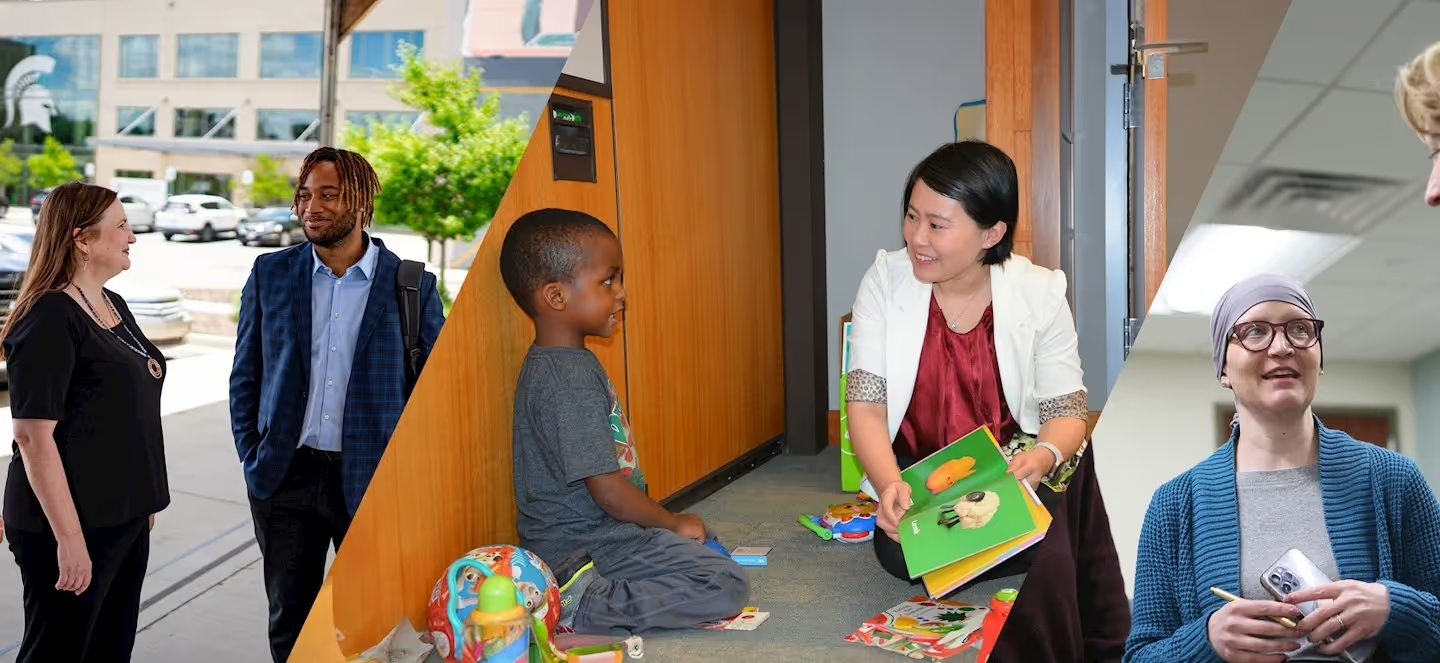Like many areas in Detroit, the west side has had better days. Its historic neighborhoods, mansions and parks, all of which came to fruition in the early 20th century, tell the story of booming industry and the quintessential “American Dream,” followed by a rapid decline.
Its people remain strong, many of whom are rooted in the community, having lived there for generations. Spartan nurse Angela Floyd, MSN, RN, AGCNS, CCRN, is one of them.
“I’m a west side girl,” Floyd said. “I’m serving the same people I grew up with.”
Born and raised near 6 Mile Road, Floyd got an early introduction to the healthcare field as she watched both her mother and father suffer from severe illnesses.
When Floyd was 18 years old, her father fell victim to lung cancer. Just a few years prior, her mother suffered from breast cancer, which required multiple rounds of chemotherapy and a mastectomy.
Throughout this time, Floyd focused her efforts toward various medical career clubs that were offered through Detroit Public Schools, hoping to pave the way for her dreams. She excelled at Renaissance High School, located just minutes from her home.
“The path chose me,” Floyd recalled. “I grew up with sick parents and I have dedicated my career to giving back to other families in the same situation.”
While completing her Bachelor of Science in Nursing (BSN), Floyd continued working as a certified nursing assistant at Henry Ford Hospital in Detroit. In the past 12 years, Floyd has evolved in her profession, obtaining her advanced nursing degree from the college, all while staying in the place she calls home.
“MSU gave me the confidence and always encouraged creativity as I’ve moved it into my profession,” she said.
Floyd is now a clinical nurse specialist (CNS) at Henry Ford Hospital, which has given her a holistic perspective at the issues Black Americans face when it comes to healthcare.
“Many of my patients are hesitant to disclose information to providers that don’t look like them,” she said.
“The problem isn’t access to care. Getting patients to the access is the challenge.” —Angela Floyd
In addition to lack of medical insurance, distrust in healthcare professionals of a different race is common amongst the Black community, and for good reason says Floyd.
“Based on historical patterns that have occurred in our culture, many African Americans are very skeptical about their treatment or motives of the provider,” she said.
The Tuskegee Experiment is one example. In 1932, The U.S. Public Health Service (USPHS) began working with the Tuskegee Institute of Macon, Ala., to study the effects of untreated syphilis in Black males. In doing so, they recruited 600 participants, about 400 of which suffered from syphilis, according to The HISTORY Channel.
The men were told they would receive free meals, medical exams and burial insurance, in exchange for participating in the study. In 1943, penicillin became the treatment of choice for syphilis, yet it was deliberately kept from the research subjects after USPHS researchers convinced physicians not to treat them.
As a result, 28 participants died from syphilis, while over 100 participants later lost their lives due to complications from the disease. In addition, at least 40 spouses were diagnosed with syphilis and it was spread to 19 children at birth, according to the Centers for Disease Control and Prevention.
“I have the opportunity to make a big impact and that’s important for me,” Floyd said.
Through her role as a CNS, Floyd hopes that by adding diversity to her field, Black Americans will be less skeptical and receive a much more holistic approach to their care, resulting in better patient outcomes.
“The problem isn’t access to care,” she said. “We have the resources and top-rated, level-one trauma units. Getting patients to the access is the challenge.”
College of Nursing Instructor John Mailey, MSN, RN, A-GNP-C, CCRN, works alongside Floyd at Henry Ford as a nurse practitioner and shares a similar perspective.
“I don’t think there are enough providers that look like the people that they serve,” he says. “Detroit has an 85% African-American community, and less than 10% of the providers are of the same ethnicity. That’s a big disparity.”
Along with the elderly population, Mailey sees the same skepticism shared by younger Black Americans, especially with the COVID-19 vaccine.
“You can see distrust in the vaccination process, especially with the older community, and rightfully so,” Mailey said. “We have older people in the community who can deliver first-hand knowledge of the racism they endured. These stories carry down generations.”
Despite the uphill battle, Floyd remains passionate about treating her patients and the possibilities that await.
“We have to start encouraging more minorities to enter the field. We’d see an increase in patient compliance in my opinion,” Floyd said. “It has to do with our family structure. Our culture has been abused and it leads to repetitive cycle.”
Get the latest updates on our programs and initiatives.


